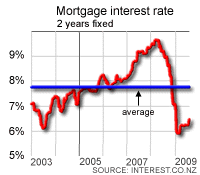Why homebuyers should assume a 10% mortgage rate
By Bernard Hickey
I’ve been in that horrible position where you can juuuuusssst strreeettch your finances to buy that dream house if you assume low interest rates and a rising salary. We’ve all done it, but it’s a dangerous thing to do as we enter an era of low inflation, rising unemployment and rising interest rates.
 Right now as we head into a spring home buying season amid talk of a rising market, many buyers will be pulling out their calculators and stretching their finances. The slump in fixed mortgage rates to around 6% is particularly tempting. It’s amazing what you can afford when interest rates are 6% and you believe your job will always be there.
Right now as we head into a spring home buying season amid talk of a rising market, many buyers will be pulling out their calculators and stretching their finances. The slump in fixed mortgage rates to around 6% is particularly tempting. It’s amazing what you can afford when interest rates are 6% and you believe your job will always be there.
But there are very good reasons to be careful, and more careful than others in the past.
The average bank 2 year fixed mortgage rate has averaged 7.74% since July 2002 when interest.co.nz started collecting data. Reserve Bank figures show the average variable mortgage rate for a new customer averaged 8.45% over the last year.
If you assume that interest rates are likely to average around 8% for the next 10 years then you have to assume that for some period in the next 10 years you will be paying a 10% mortgage rate. The memories should be relatively fresh for many who had to fix at that level as recently as early 2008.
So why do so many assume 6% will last forever?
It’s tempting to believe Reserve Bank Governor Alan Bollard when he says the Official Cash Rate will remain at or below the current record low of 2.5% until the latter half of 2010. Also, the economy has been in a long recession and is expected to stutter rather than jump out of it. Economists globally are talking about ‘W’ shaped recessions and Japanese style stagnations. Surely interest rates will stay low?
The difference is that governments are borrowing very heavily to try to spend their way out of recessions. The US government is expected to borrow at least US$1.8 trillion this year and possibly more next year. Our own government plans to borrow NZ$50 billion over the next four years. This has already pushed up interest rates and will continue to push up interest rates, particularly as central banks move inevitably to ‘exit’ from their massive monetary stimulus packages of money printing and low interest rates.
There is a risk that longer term wholesale interest rates rise sharply in the next two years and certainly over the next 10 years.
Wage inflation may not save us
In the mid 1970s and mid 1980s when many homebuyers bought houses and stretched their ability to service those mortgages, they could be confident that wage inflation would dig them out of trouble.
Inflation works wonders to reduce the real value of debt, which is why lenders hate inflation with a passion and why debt prices for fixed interest securities fall and yields rise during periods of high inflation.
But I have my doubts about wage inflation helping reduce debts this time. If anything, inflation is very low and likely to remain low because of the massive excess capacity of labour and machines now built into the global economy. We have already seen wage growth in New Zealand drop sharply.
Unemployment is rising
Unemployment is still rising and is expected to head for 8% from the current 6% over the next couple of years. Those assuming they can service a mortgage often assume they can never lose their job.
I can imagine nothing worse than not having a job and not being able to service the mortgage on a reduced wage.
Here is our calculator to work out both the weekly mortgage servicing costs and the total cost over the life of a mortgage.
I’d suggest checking out what the monthly payments would be with a 10% mortgage rate and how that compares with your current wage or salary. Can you handle it?
And let’s not forget about the unexpected pregnancy or sickness or the need to look after sick relatives.
Or the risk that house prices might fall.
Here is a cautionary tale for those thinking of stretching their budgets. A couple in Cambridge have just had their house sold in a mortgagee sale after they took on NZ$390,000 of debt they couldn’t afford.
To read this and other articles click here
This article is kindly republished courtesy of Interest.co.nz
Posted: 18 Aug 2009
News articles
Browse articles
by date


